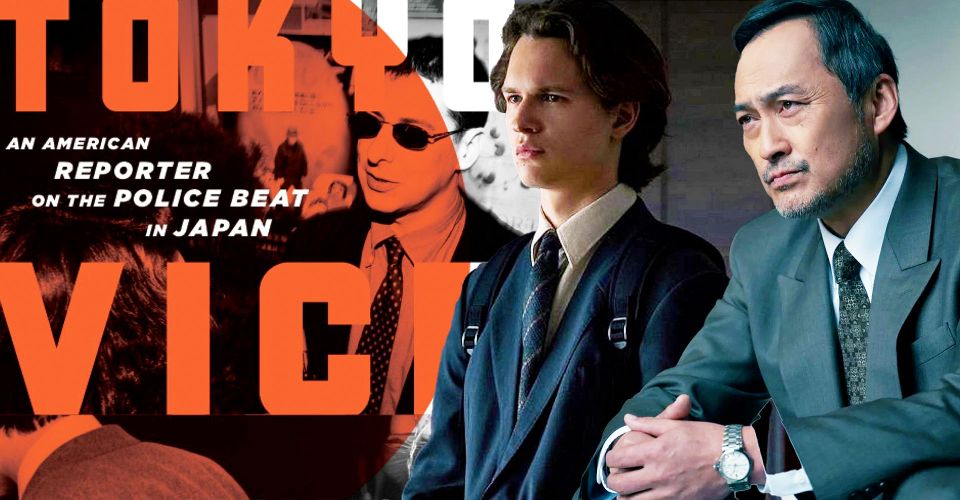Tokyo Vice True Story Explained (And What The TV Show Changes)

HBO Max’s Tokyo Vice is the platform’s latest original series, adapting the book Tokyo Vice: An American Reporter on the Police Beat in Japan from author Jake Adelstein, begging the question of just how much of the story is true. The show was created and written by J.T. Rogers, who also serves as showrunner, with veteran director Michael Mann serving as the pilot director, setting the tone, style, and pace for the series. Tokyo Vice stars Ansel Elgort as Adelstein, with Ken Watanabe as Detective Hiroto Katagiri, Rachel Keller as Samantha, Ella Rumpf as Polina, Shô Kasamatsu as Sato, Hideaki Itô as Jin Miyamoto.
The real Adelstein moved to Japan when he was 19 years old and was hired to work for the largest newspaper in the world, the Yomiuri Shinbun, eventually assigned to work the police beat in Tokyo. Adelstein worked for the paper from 1993 to 2005, publishing his Tokyo Vice memoir in 2009. The book was optioned by Paramount to become a feature film starring Daniel Radcliffe as Adelstein, but it ended up falling through, leading to HBO, where Rogers was hired to adapt it as a TV show for the network.
Tokyo Vice showrunner J.T. Rogers has said that while the HBO Max adaptation is inspired by real events, but is still fiction, serving as neither biography nor documentary. Outside of Adelstein, none of the supporting characters are meant to represent actual people in real life, despite some stark similarities. Ultimately, the story focuses on the setting, digging into the time period when the Yakuza were a powerful force in Tokyo before their downfall. The series covers events related to Adelstein’s book, including a Yakuza boss informing on his own crew in order to get a liver transplant in the U.S., as well as a number of notable crimes the real Adelstein encountered during his tenure at the paper. While there are shades of truth to actual events, many characters are condensed, changed, or altered to fit the series narrative, rather than an actual retelling of events, despite a number of very specific callbacks in some instances.
What Actually Happened In Tokyo Vice

Adelstein was the first American to be hired to write for the Yomiuri Shinbun, and spent 12 years doing so, forming relationships with local police, reporters, gang members, and civilians. He worked the police beat throughout his time in Japan, which required 80-hour work weeks, navigating the world as a gaijin (outsider), and encountering the unique cultural and societal challenges of the region while attempting to write about things that matter. Adelstein investigated everything from murders to fraud to suicides to arson and everything in between, including breaking the story about a Yakuza boss, Tadamasa Goto, who was acting as an FBI informant, sharing information about his gang in order to receive a liver transplant in the United States. The paper would not publish the story, which forced Adelstein to quit and publish on his own.
What Tokyo Vice Changes About The True Story

While Adelstein remains the primary protagonist of the story and represents his actual journey, it is not a line-by-line adaptation of the book by any means. West Side Story‘s Elgort portrays Adelstein in a mostly accurate way, while still adding his own spin on the character. Everyone else in the story (including the name of the newspaper) has been changed to fit the series’ needs, with some characters being a representation of many real-world individuals, such as Rinko Kikuchi’s editor character, who is an amalgam of multiple people in Adelstein’s life. The time period skips around as well, using flashbacks and flash-forwards, rather than capturing a specific time from the book (Adelstein worked from 1993 – 2005 in real life, but in the show, he begins working at the paper in 1999). Ultimately, Tokyo Vice adapts Adelstein’s book loosely, utilizing what it needs in order to tell a fictional story that’s based on real events, but never as a full-on adaptation.
Did Jake Adelstein Really Work With An Older Police Detective?

In Tokyo Vice, Ken Watanabe’s character is based on detective Chiaki Sekiguchi, a real police detective that mentored Adelstein throughout his time as a reporter for the Yomiuri Shinbun. Named Hiroto Katagiri in the show, Watanabe portrays the character as a mentor to Elgort’s Adelstein, telling him at one point that he’s like the son he never had. According to Adelstein, the real Sekiguchi was a mostly sweet-natured family man, but was more brutal in his tactics toward the Yakuza, a duality that’s portrayed in the show. The real Sekiguchi died in 2008 from cancer and Adelstein has continued to speak fondly of the advice he received from the man over the years and in the trenches as a reporter. In fact, he gave Adelstein words he continues to live by, “Know the difference between hearing and listening, and learn to listen to people.” This is emphasized in their interactions on the show, giving weight to the real character Watanabe represents.

Throughout his time as a reporter, Adelstein leaned into investigating the Yakuza, despite the paper’s aversion to it due to fear of retribution from the Tokyo crime syndicate. However, as police became more and more involved in cracking down on the Yakuza and new laws were introduced to restrict them, Adelstein was able to dig deeper into the criminal underworld and gain an understanding that few could match. However, this also ruffled feathers within the organization, particularly when he reported on Yakuza boss Tadamasa Goto and his liver transplant controversy. Before the story broke, Adelstein’s life was threatened, with the Yakuza telling him, “Either erase the story, or we’ll erase you.” The paper would not publish the story, but Adelstein did end up having it published via The Washington Post in 2008.
What Happened After Jake Adelstein Left The Newspaper (Did He Go Back To The U.S.?)

Tokyo Vice‘s Jake Adelstein continues to be a reporter, currently living in Tokyo and writing for The Daily Beast, Asia Times, Vice News, and The Japan Times. He worked as the chief investigator for a United States Department of State human trafficking investigation and currently sits on the board for the Polaris Project Japan, a nonprofit that helps victims of human trafficking. Adelstein has appeared in Ted Talks, NatGeo documentaries, etc. as a subject matter expert on the criminal underworld of Japan, often sought out for his expertise in the area. In 2017, he became a Zen Buddhist and will release a sequel memoir to Tokyo Vice in 2023, entitled Tokyo Private Eye.
Tokyo Vice is now playing on HBO Max with new episodes every Thursday.
About The Author
















